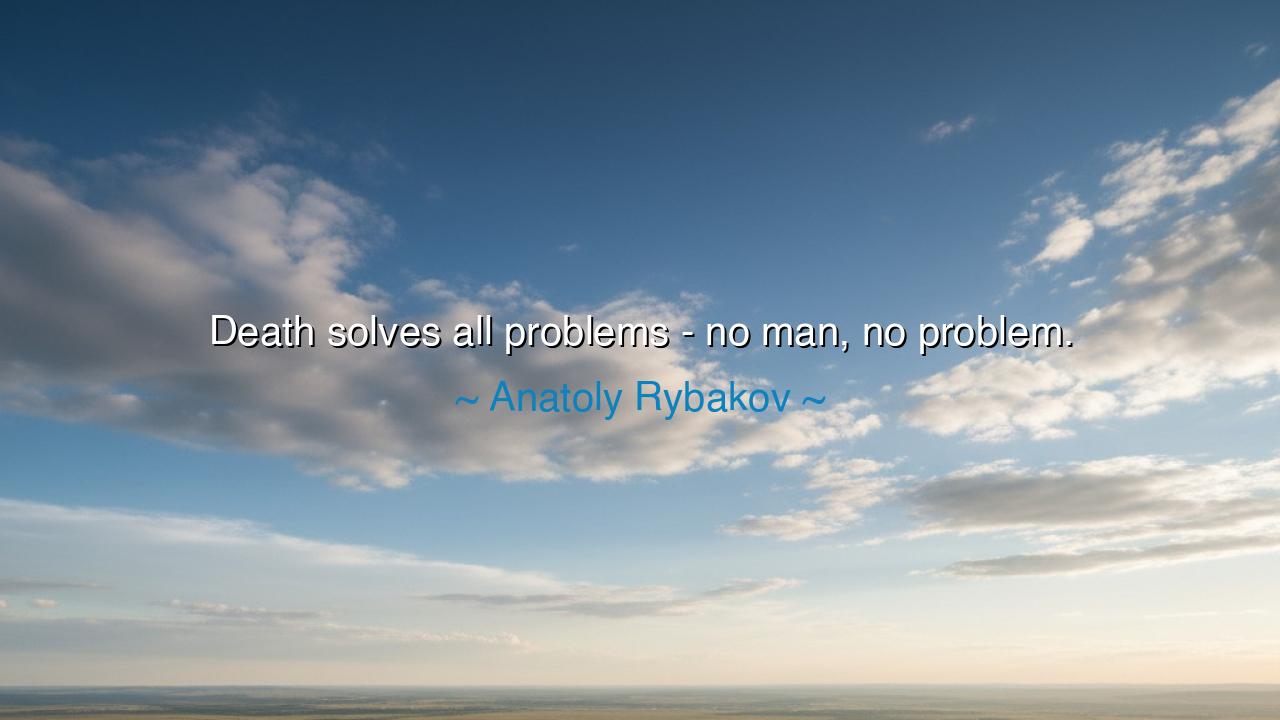
Death solves all problems - no man, no problem.






“Death solves all problems — no man, no problem.” — Anatoly Rybakov
This grim and piercing saying, often attributed to Joseph Stalin, was popularized by the writer Anatoly Rybakov in his novel Children of the Arbat, a work that laid bare the soul of tyranny and the terror of power unrestrained. Within these few words lies a chilling reflection on the cruelty of systems that value control above compassion, obedience above truth. “Death solves all problems — no man, no problem” is not the voice of wisdom, but the voice of despotism — a mirror held up to the darkness of human history, that we may learn to fear and resist it.
Rybakov, who lived through the storms of Stalin’s rule, understood what it meant to breathe in a land where suspicion was a weapon and silence a shield. His words capture the brutal logic of those who rule by fear: that the easiest way to erase dissent is to erase the dissenter. To such men, life is expendable; the death of one is the convenience of many. But in writing these words, Rybakov did not endorse them — he exposed them, so that generations might remember the cost of inhumanity disguised as order.
The ancients, too, knew that power untempered by mercy turns monstrous. Herodotus wrote of the Persian kings who silenced critics by execution, believing themselves gods among men. Yet every empire that worshiped fear crumbled upon its own cruelty. For though death may silence a voice, it cannot silence the truth that gave that voice meaning. In this way, Rybakov’s quote becomes not a statement of policy, but a warning: that the path of death, chosen by tyrants to solve problems, leads only to a kingdom of ghosts.
Let us remember Nikolai Bukharin, one of the brilliant minds of the early Soviet revolution — a man once praised as a hero, later condemned as an enemy. In the purges of the 1930s, his name was blackened, his loyalty questioned, and finally, his life taken. To the tyrant, his death solved a problem. But in time, his innocence was restored, and history itself rose to accuse his executioners. Thus we learn that death may end a life, but never the consequences of injustice. Truth endures, even when buried beneath the weight of lies.
There is another, deeper meaning in this phrase, one that speaks to all ages: that when we see others merely as problems to be removed, we have already surrendered our humanity. The murderer and the bureaucrat share this corruption of the heart — to see a person not as a soul, but as an obstacle. To think that “no man, no problem” is to forget that every man is a world, a bearer of hopes and dreams, whose destruction diminishes us all. The ancients called this forgetting “the death of the spirit” — a death more final than any execution.
And yet, within this darkness, there is a light of understanding. Rybakov’s use of the phrase teaches us vigilance — to recognize the voice of death when it disguises itself as reason. In every age, there will be those who claim that certain lives are expendable, that violence is necessary for peace, that destruction is a form of progress. Against them, we must hold the wisdom of compassion, for only life can solve the problems of life. To choose death as the answer is to choose emptiness.
So let this saying be remembered not as guidance, but as warning. Beware the logic that kills for convenience, that seeks to end suffering through annihilation, or to build harmony upon silence. The true strength of a people lies not in their power to destroy, but in their will to forgive, to listen, to build. For as long as one voice dares to speak against cruelty, as long as one heart chooses mercy over vengeance, the problem is not death — it is the rebirth of conscience.






AAdministratorAdministrator
Welcome, honored guests. Please leave a comment, we will respond soon